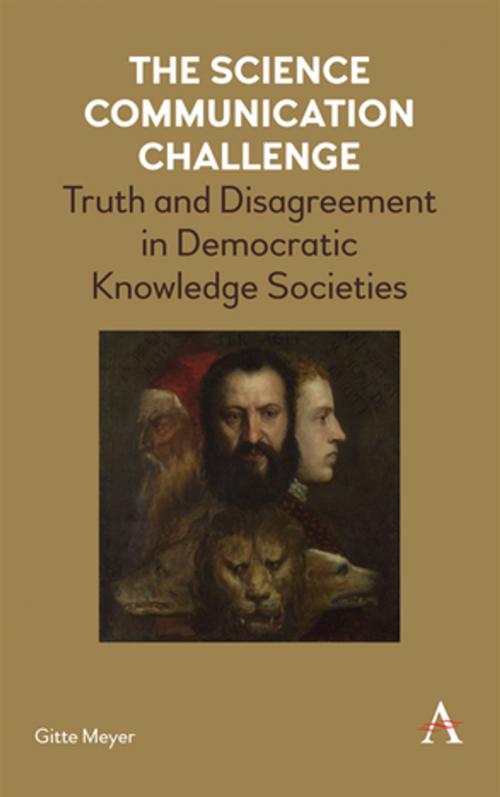The Science Communication Challenge
Truth and Disagreement in Democratic Knowledge Societies
Nonfiction, Science & Nature, Science, Other Sciences, Philosophy & Social Aspects, Religion & Spirituality, Philosophy, Political| Author: | Gitte Meyer | ISBN: | 9781783087556 |
| Publisher: | Anthem Press | Publication: | March 26, 2018 |
| Imprint: | Anthem Press | Language: | English |
| Author: | Gitte Meyer |
| ISBN: | 9781783087556 |
| Publisher: | Anthem Press |
| Publication: | March 26, 2018 |
| Imprint: | Anthem Press |
| Language: | English |
Current knowledge societies tend to be based on an understanding of science as an all-purpose problem-solver and include the expansion of scientific methods and frameworks of thought to ever more areas of life. Such development is less pragmatic and down-to- earth than it may appear at first glance. It is accompanied by a relentless expansion of the domain of a logic of universal truth and its technical equivalent: correct solutions, and is tied to a general understanding of science communication as a didactic enterprise aimed at disseminating scientific ways of thinking and responses to problems to a lay public of non-knowers.
Potentially, it seems, science can provide answers to all questions. Disagreement appears as no more than a symptom of immature science and has no place within the didactic science communication paradigm. As a consequence, democratic knowledge societies are challenged as political entities in the classical, pluralist sense, characterized by continuous discussion among different points of view and ways of reasoning on societal issues and using disagreement as a vehicle for discussions, negotiations and compromises.
Against such a background, ‘The Science Communication Challenge’ suggests that the didactic approaches to science communication be supplemented with a political category of science communication, suited to practical-political issues and featuring citizens on an equal footing – some of them scientists – who represent different points of view and ways of reasoning and share responsibility for public affairs. The possible gain, it is argued, may be the maintenance of knowledge societies as political entities with room for a civil society of multiple positions and perspectives that has served as a fertile ground for the development of science as an intellectual endeavour and as a body of knowledge and rational methodology.
Drawing on insights from an array of academic fields and disciplines, ‘The Science Communication Challenge’ explores the possible origins of the didactic paradigm, connecting it to particular understandings of knowledge, politics and the public and to the seemingly widespread assumption of a science-versus-politics dichotomy, taking science and politics to be competing activities that are concerned with similar questions in different ways. Inspired by classical political thought it is argued that science and politics be seen as substantially different activities, suited to dealing with different kinds of questions – and to different varieties of science communication.
Current knowledge societies tend to be based on an understanding of science as an all-purpose problem-solver and include the expansion of scientific methods and frameworks of thought to ever more areas of life. Such development is less pragmatic and down-to- earth than it may appear at first glance. It is accompanied by a relentless expansion of the domain of a logic of universal truth and its technical equivalent: correct solutions, and is tied to a general understanding of science communication as a didactic enterprise aimed at disseminating scientific ways of thinking and responses to problems to a lay public of non-knowers.
Potentially, it seems, science can provide answers to all questions. Disagreement appears as no more than a symptom of immature science and has no place within the didactic science communication paradigm. As a consequence, democratic knowledge societies are challenged as political entities in the classical, pluralist sense, characterized by continuous discussion among different points of view and ways of reasoning on societal issues and using disagreement as a vehicle for discussions, negotiations and compromises.
Against such a background, ‘The Science Communication Challenge’ suggests that the didactic approaches to science communication be supplemented with a political category of science communication, suited to practical-political issues and featuring citizens on an equal footing – some of them scientists – who represent different points of view and ways of reasoning and share responsibility for public affairs. The possible gain, it is argued, may be the maintenance of knowledge societies as political entities with room for a civil society of multiple positions and perspectives that has served as a fertile ground for the development of science as an intellectual endeavour and as a body of knowledge and rational methodology.
Drawing on insights from an array of academic fields and disciplines, ‘The Science Communication Challenge’ explores the possible origins of the didactic paradigm, connecting it to particular understandings of knowledge, politics and the public and to the seemingly widespread assumption of a science-versus-politics dichotomy, taking science and politics to be competing activities that are concerned with similar questions in different ways. Inspired by classical political thought it is argued that science and politics be seen as substantially different activities, suited to dealing with different kinds of questions – and to different varieties of science communication.















